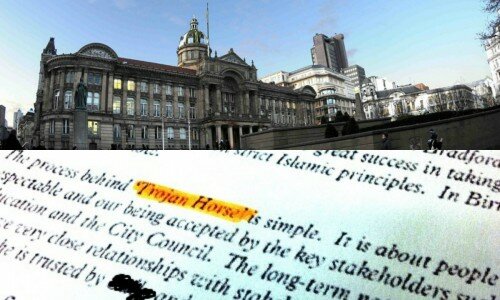
Trojan Horse witnesses ‘feared for their safety and their families’, MPs told
Witnesses giving evidence to a Trojan Horse inquiry feared for the safety of themselves and their families if their names had been passed to Birmingham city council, MPs have been told.
Peter Clarke, the education commissioner appointed to investigate claims of a hardline Muslim takeover of schools, admitted that some people had lost all faith in the council’s ability to act properly and would only talk to him on the understanding that he would not pass on their details.
There was a “genuine fear for the consequences” among professionals, including teachers, if their names had become known to the local authority, Mr Clarke told the House of Commons Education Committee.
Potential witnesses were concerned about being accused of racism or Islamaphobia if they spoke out about what had happened, he added.
Mr Clarke said: “Some were genuinely afraid for their careers, and some for their personal safety and that of their families.
“They had lost all faith and confidence in the city council.”
The names of all witnesss giving evidence to Mr Clarke’s were redacted in his final report, which found evidence of an “aggressive Islamist agenda” in east Birmingham schools.
Mr Clarke told MPs he had found very clear evidence of governors and teachers who were sympathetic to or did not challenge extremist views, although there was no evidence of direct radicalisation of children.
He urged the Department for Education to launch an inquiry into whether the Trojan Horse events in Birmingham are being repeated in schools in other cities.
He listed “unacceptable practices” that included anti-Christian chanting led by a teacher at one school, children being “strongly encouraged” to attend the call to prayer and segregation of the sexes in classrooms.
A general “air of intolerance to other religions or a way of life” and a “narrowing of the world view of pupils” meant that children might be more at risk of radicalisation in the future.
Scores of emails between governors and teachers at the Trojan Horse schools included “explicit homophobia; highly offensive comments about British service personnel; a stated ambition to increase segregation in the school; disparagement of strands of Islam; scepticism about the truth of reports of the murder of Lee Rigby and the Boston bombings; and a constant undercurrent of anti-western, anti-American and anti-Israeli sentiment”.
His account was backed up by Ian Kershaw, the independent adviser appointed by Birmingham council to examine the Trojan Horse claims. Mr Kershaw said it became clear when he began investigating that many people were nervous about talking to him.
“There was a genuine fear about people’s families, their careers and whether they would be able to hold on to their jobs if they were found out.”
Birmingham council officials had been aware of what was happening since 2007 but were not prepared to take action, Mr Kershaw added. The inappropriate behaviour of governors could have been “nipped in the bud” seven years ago but council officers did not have the confidence to act.
Mr Kershaw told MPs he had uncovered evidence of a group of Pakistani men in east Birmingham who had learnt “to work through the system” in an improper way. They had a genuine concern about the standard of education but did not know how to improve matters through “proper means”.
He urged the council to set up a small rapid reaction task force to quickly investigate any future claims of inappropriate behaviour in Birmingham schools.
Cllr Brigid Jones, cabinet member for children’s services, told the committee she had offered to resign over the Trojan Horse reports, which exposed the council’s failing. But council leader Sir Albert Bore told her she was “part of the solution, not the problem”.
Cllr Jones insisted there had been “no explicit instruction” given to officials not to upset Muslim communities. Any such order would have been “bizarre”.
She added that “everyone had a piece of the jigsaw” and knew something of what was happening, but no one put the pieces together until it was too late.
Some headteachers were afraid and had experienced a “very difficult personal time” dealing with governors and suffering from harassment and bullying. The heads often lived in the communities they worked in and were afraid to speak out.
Cllr Jones told MPs the council had wanted to run one joint Trojan Horse inquiry with the Department for Education and Ofsted, but had been over-ruled by Michael Gove, the former Education Secretary. The cost to the council of the Kershaw review was about £500,000, she revealed.
Birmingham council chief executive Mark Rogers said the Clarke and Kershaw reports uncovered “extreme views that have no place in schools”. Mr Rogers accepted that the behaviour of some individuals could make children “vulnerable to extremist influences”.
Asked why the council failed to listen to headteachers who complained about the conduct of governors, Mr Rogers said: “Remarkable though it is to me, we had people who didn’t see patterns where patterns should have been seen. They just didn’t see them.
“Some scales have fallen off our eyes during this process and we can see much more clearly what has been going on and what to do about it.”
Similar Articles
PM: gave unlawful advice; frustrated Parliament
"Scenes." As young people would say, writes Kevin Johnson. "Unlawful." "Unequivocal." "Historical." These words are not,
WMCA: Nothing to see here…move along
As the Prime Minister prepared to address leaders ‘up North’ gathering for the Convention of
HS2: new driver needed
Is the Oakervee Review "welcome", "frustrating" or the end of the line for HS2, asks
Dawn goes Down Under
It might appear that Birmingham city council changes its chief executives more regularly than its
Hezza: Give Metro Mayors greater powers to deliver housing, skills and jobs
Britain’s metro mayors should be given greater powers over housing, schools and jobs to truly










